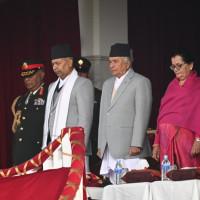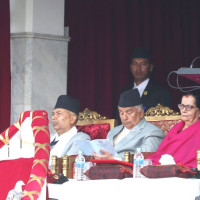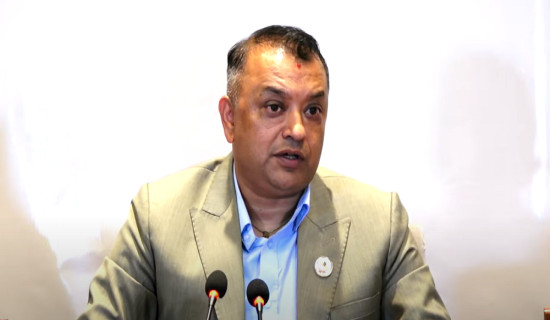- Friday, 20 February 2026
Paradigm Shift In Gender Stereotyte
Nepal recently legalised same-sex marriage, breaking traditional norms and promoting inclusivity. This sparked debates on religion and conservatism, pitting personal freedom against traditional beliefs. LGBTQI+ advocates, like Sunil Babu Pant, played a crucial role in shaping public opinion. Their efforts aim to make Nepal a leader in LGBTQI+ rights in Asia. Nepal's acceptance of same-sex unions is linked to its democratic values. In 2007, the Supreme Court in Pant v. Nepal ruled that being gender non-conforming or having same-sex orientation is natural, not a mental disorder.
The court emphasised that LGBTI identities are natural and recognised the right to privacy for all, including LGBTI individuals. It declared that penalising same-sex relations as "unnatural" goes against fundamental rights, stressing the importance of non-discrimination. Sunil Babu Pant’s (founder of Blue Diamond Society) efforts, from local advocacy to international initiatives like Pink Mountains, showcase Nepal as a global advocate for LGBTQI+ rights. Pink Mountains reflects a commitment to providing a unique and welcoming experience for LGBTQI+ tourists.
The introduction of elaborate honeymoon packages showcases a nuanced understanding of the diverse needs within the LGBTQI+ community. The Pink Mountains are not only promoting tourism but also fostering connections and understanding between different cultures. The South Asia LGBT Sports Festival in 2012 and Pant's strategic use of the Gaijatra festival symbolise a shift from local struggles to a global cause. The country's courageous move to host Asia's first-ever sports tournament for the LGBTQI+ community in 2012 demonstrates Nepal's commitment to fostering inclusivity and challenging societal norms. Although Nepal's sexual orientation and gender identity (SOGI) activism initially lagged behind that of its neighbour India, the country demonstrated exceptional courage by hosting Asia's inaugural sports tournament.
The South Asia LGBT Sports Festival, organised by the Blue Diamond Society at the national stadium in Kathmandu, marked a significant milestone and showcased Nepal's commitment to inclusivity. The internationalisation of this march reflects the interconnectedness of global LGBTQI+ communities, emphasising the shared goals of equality, acceptance, and the celebration of love irrespective of gender identity or sexual orientation.
As a strategic and symbolic move, Pant leveraged the Gaijatra festival, a traditional Nepali event known for its celebration of diversity, satire, and remembrance of those who have passed away during the year. Pant saw this festival as an opportune moment to challenge societal norms and prejudices by creating a platform for sexual minorities to "come out" and assert their presence in public spaces. By intertwining this traditional celebration with the modern struggle for LGBTQI+ rights, it aims to bridge generational and cultural gaps, demonstrating that acceptance and celebration of diversity are values that can coexist with longstanding traditions.
In an ice-breaking move, Nepal is making strides towards inclusivity by allowing transgender contestants like Angel Lama to participate in its national pageant. This progressive step makes Nepal only the third country in Asia, after Myanmar and Mongolia, to embrace the inclusion of transgender individuals in their esteemed national pageants.
Angel Lama's presence as a finalist in the Miss Universe Nepal competition is not merely a personal achievement but a broader societal shift towards recognising and celebrating diversity. While Nepal's decision to allow transgender contestants is a commendable step forward, it also highlights the need for more countries to embrace similar inclusivity.
Redefining freedom
The marriage between Surendra Pandey and Maya Gurung exemplifies a paradigm shift in societal attitudes. Recognising same-sex marriage as an extension of the democratic principle of "freedom of choice" challenges historical prejudices and expands personal autonomy. Drawing on philosophers like Isaiah Berlin and John Stuart Mill, the argument emphasises that protecting sexual liberties is essential for societal progress and should transcend cultural biases.
Isaiah Berlin asserted in 1969 that the essence of freedom lies in minimising interference, stating, "The wider the area of non-interference, the wider my freedom.” Moreover, within the framework of a democracy, sexual liberties are integral to individual rights and must be zealously protected. The idea that democracy is a developmental phenomenon takes on new meaning when we recognise that safeguarding sexual liberties is essential for societal progress. John Stuart Mill's timeless assertion, dating back to 1859, remains pertinent: "The only purpose for which power can be rightfully exercised over any member of a civilised community, against his will, is to prevent harm to others.” Additionally, in the context of the developing world, where cultural norms often play a dominant role, it becomes imperative to shield sexual liberties from becoming victims of cultural bias.
Recent developments
Nepal's historic move on November 29, 2023, in Dordi Rural Municipality to officially register a same-sex marriage, following the Supreme Court's directive, establishes it as a pioneer in South Asia. On June 27, 2023, Nepal's Supreme Court issued an interim order, a pivotal decree that paved the way for the registration of same-sex marriages. This legal advancement was a significant leap forward in acknowledging and affirming the rights of the LGBTQI+ community. However, the journey for Pandey and Gurung was not without obstacles. The involvement of the judiciary reflects a commitment to equality and nondiscrimination.
Despite India's recent Supreme Court verdict on October 16, 2023, a five-judge bench of the Supreme Court of India announced a 3:2 verdict on petitions seeking the rights of members of the LGBTQ community to marry and choose family. The Court declined to legalise same-sex marriage, placing it upon the Parliament and province governments to decide if non-heterosexual unions can be legally recognised, while Nepal's journey emphasises the ongoing pursuit of full inclusivity, blending legal initiatives with societal evolution.
Nepal's trajectory towards recognising and legally sanctioning same-sex marriages is a testament to the delicate interplay of tradition, democracy, and tireless activism. While legal milestones are crucial, societal acceptance remains a challenge. Legal reforms must complement their success with genuine cultural and societal acceptance.
(The author is an assistant professor of the Department of Political Studies at the Central University of South Bihar.)







-square-thumb.jpg)








